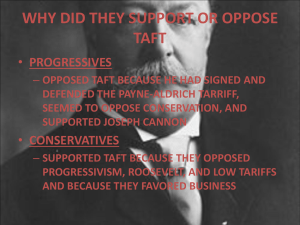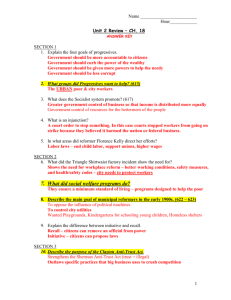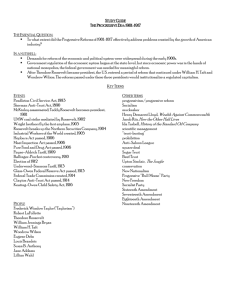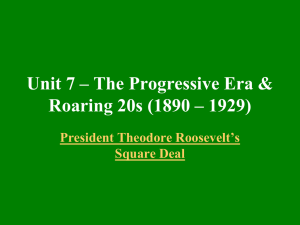Northwest Cabarrus High School Advanced Placement United
advertisement
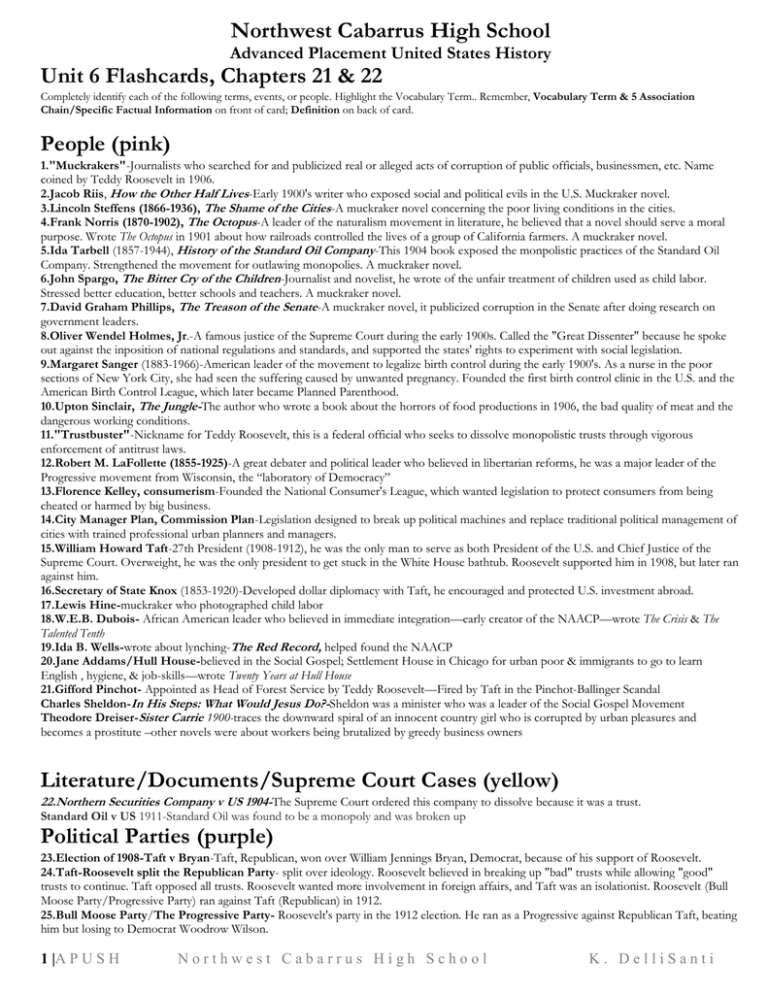
Northwest Cabarrus High School Advanced Placement United States History Unit 6 Flashcards, Chapters 21 & 22 Completely identify each of the following terms, events, or people. Highlight the Vocabulary Term.. Remember, Vocabulary Term & 5 Association Chain/Specific Factual Information on front of card; Definition on back of card. People (pink) 1."Muckrakers"-Journalists who searched for and publicized real or alleged acts of corruption of public officials, businessmen, etc. Name coined by Teddy Roosevelt in 1906. 2.Jacob Riis, How the Other Half Lives-Early 1900's writer who exposed social and political evils in the U.S. Muckraker novel. 3.Lincoln Steffens (1866-1936), The Shame of the Cities-A muckraker novel concerning the poor living conditions in the cities. 4.Frank Norris (1870-1902), The Octopus-A leader of the naturalism movement in literature, he believed that a novel should serve a moral purpose. Wrote The Octopus in 1901 about how railroads controlled the lives of a group of California farmers. A muckraker novel. 5.Ida Tarbell (1857-1944), History of the Standard Oil Company-This 1904 book exposed the monpolistic practices of the Standard Oil Company. Strengthened the movement for outlawing monopolies. A muckraker novel. 6.John Spargo, The Bitter Cry of the Children-Journalist and novelist, he wrote of the unfair treatment of children used as child labor. Stressed better education, better schools and teachers. A muckraker novel. 7.David Graham Phillips, The Treason of the Senate-A muckraker novel, it publicized corruption in the Senate after doing research on government leaders. 8.Oliver Wendel Holmes, Jr.-A famous justice of the Supreme Court during the early 1900s. Called the "Great Dissenter" because he spoke out against the inposition of national regulations and standards, and supported the states' rights to experiment with social legislation. 9.Margaret Sanger (1883-1966)-American leader of the movement to legalize birth control during the early 1900's. As a nurse in the poor sections of New York City, she had seen the suffering caused by unwanted pregnancy. Founded the first birth control clinic in the U.S. and the American Birth Control League, which later became Planned Parenthood. 10.Upton Sinclair, The Jungle-The author who wrote a book about the horrors of food productions in 1906, the bad quality of meat and the dangerous working conditions. 11."Trustbuster"-Nickname for Teddy Roosevelt, this is a federal official who seeks to dissolve monopolistic trusts through vigorous enforcement of antitrust laws. 12.Robert M. LaFollette (1855-1925)-A great debater and political leader who believed in libertarian reforms, he was a major leader of the Progressive movement from Wisconsin, the “laboratory of Democracy” 13.Florence Kelley, consumerism-Founded the National Consumer's League, which wanted legislation to protect consumers from being cheated or harmed by big business. 14.City Manager Plan, Commission Plan-Legislation designed to break up political machines and replace traditional political management of cities with trained professional urban planners and managers. 15.William Howard Taft-27th President (1908-1912), he was the only man to serve as both President of the U.S. and Chief Justice of the Supreme Court. Overweight, he was the only president to get stuck in the White House bathtub. Roosevelt supported him in 1908, but later ran against him. 16.Secretary of State Knox (1853-1920)-Developed dollar diplomacy with Taft, he encouraged and protected U.S. investment abroad. 17.Lewis Hine-muckraker who photographed child labor 18.W.E.B. Dubois- African American leader who believed in immediate integration—early creator of the NAACP—wrote The Crisis & The Talented Tenth 19.Ida B. Wells-wrote about lynching-The Red Record, helped found the NAACP 20.Jane Addams/Hull House-believed in the Social Gospel; Settlement House in Chicago for urban poor & immigrants to go to learn English , hygiene, & job-skills—wrote Twenty Years at Hull House 21.Gifford Pinchot- Appointed as Head of Forest Service by Teddy Roosevelt—Fired by Taft in the Pinchot-Ballinger Scandal Charles Sheldon-In His Steps: What Would Jesus Do?-Sheldon was a minister who was a leader of the Social Gospel Movement Theodore Dreiser-Sister Carrie 1900-traces the downward spiral of an innocent country girl who is corrupted by urban pleasures and becomes a prostitute –other novels were about workers being brutalized by greedy business owners Literature/Documents/Supreme Court Cases (yellow) 22.Northern Securities Company v US 1904-The Supreme Court ordered this company to dissolve because it was a trust. Standard Oil v US 1911-Standard Oil was found to be a monopoly and was broken up Political Parties (purple) 23.Election of 1908-Taft v Bryan-Taft, Republican, won over William Jennings Bryan, Democrat, because of his support of Roosevelt. 24.Taft-Roosevelt split the Republican Party- split over ideology. Roosevelt believed in breaking up "bad" trusts while allowing "good" trusts to continue. Taft opposed all trusts. Roosevelt wanted more involvement in foreign affairs, and Taft was an isolationist. Roosevelt (Bull Moose Party/Progressive Party) ran against Taft (Republican) in 1912. 25.Bull Moose Party/The Progressive Party- Roosevelt's party in the 1912 election. He ran as a Progressive against Republican Taft, beating him but losing to Democrat Woodrow Wilson. 1 |A P U S H Northwest Cabarrus High School K. DelliSanti 26.Woodrow Wilson, New Freedom-He believed that monopolies had to be broken up and that the government must regulate business. He believed in competition, and called his economic plan "New Freedom." 27.Theodore Roosevelt-Square Deal-Roosevelt used this term to declare that he would use his powers as president to safeguard the rights of the workers. 28.Theodore Roosevelt, New Nationalism-A system win which government authority would be balanced and coordinate economic activity. Government would regulate business. 29.Election of 1912: Wilson, Roosevelt, Taft, Debs, -Wilson, Democrat beat Roosevelt, Progressive (Bull Moose), Taft, Republican and Debs, Socialist. The issues were the economy and growing conflict in Europe. Laws/Policy (green) 30.Democracy, efficiency, pragmatism (reasonable/logical)-Three characteristics that the U.S. felt made them superior to other countries. Many U.S. cities in the 1900 to 1920 instituted modern "scientific" political systems, such as the use of professional city managers, to replace inefficient traditional machine politics. The U.S. tried to spread there ideas abroad. 31.Initiative- people have the right to propose a new law. 32.Referendum: a law passed by the legislature can be reference to the people for approval/veto. 33.Recall: the people can petition and vote to have an elected official removed from office. These all made elected officials more responsible and sensitive to the needs of the people, and part of the movement to make government more efficient and scientific. 34.Direct Primary-An election where people directly elect their party's candidates for office. Candidates had previously been selected by party caucuses that were considered elitist and undemocratic. This made elected official more accountable to the people. 35.Progressive Amendment 16th-1913 - 16th Amendment authorized Congress to levy an income tax. 36.Progressive Amendment 17th-1913 - 17th Amendment gave the power to elect senators to the people. Senators had previously been appointed by the legislatures of their states. 37.Progressive Amendment 18th -1919 - 18th Amendment prohibited the manufacture and sale of alcoholic beverages. 38.Progressive Amendment 19th -1920 - 19th Amendment gave women the right to vote.—Western states allowed women to vote in the 1870’s (Utah, Idaho, Wyoming, Colorado)—before it was an Amendment, it was a state-by-state decision 39.Newlands Reclamation Act, 1902-Authorized the use of federal money to develop the west, it helped to protect national resources. 40.Forest Reserve Act, 1891-First national forest conservation policy, authorized the president to set aside areas of land for national forests. 41.Elkins Act, 1903, rebates-This strengthened earlier federal legislation that outlawed preferential pricing through rebates. Rebates are returns of parts of the amount paid for goods or services, serving as a reduction or discount. This act also prohibited railroads from transporting goods they owned. As a dodge around previous legislation, railroads were buying goods and transporting them as if they were their own. 42.Hepburn Act, 1906-It imposed stricter control over railroads and expanded powers of the Interstate Commerce Commission, including giving the ICC the power to set maximum rates. 43.Mann-Elkins Act, 1910-Signed by Taft, it bolstered the regulatory powers of the Interstate Commerce Commission and supported labor reforms. It gave the ICC the power to prosecute its own inquiries into violations of its regulations. 44. Food Industry Reforms Meat Inspection Act 1906-1906 - Laid down binding rules for sanitary meat packing and government inspection of meat products crossing state lines. Pure Food and Drug Act-1906 - Forbade the manufacture or sale of mislabeled or adulterated food or drugs, it gave the government broad powers to ensure the safety and efficacy of drugs in order to abolish the "patent" drug trade. Still in existence as the FDA. Smith-Lever Act, Smith-Hughes Act-1917-Established the U.S.'s first Food Administration with the authority to fix food prices, license distributors, coordinate purchases, oversee exports, act against hoarding and profiteering, and encourage farmers to grow more crops. 45.Scientific Management, Frederick W. Taylor-1911 - Increased industrial output by rationalizing and refining the production process. 46.Wisconsin, "Laboratory of Democracy"-Wisconsin was called the "Laboratory of Democracy" because many of the reform ideas of the Progressive era came out of Wisconsin, specifically from Robert M. LaFollette. 47.Regulatory commissions-Formed to set safety standards and to enforce fair practices of business competition for the sake of the U.S. public. 48.Department of Labor-Originally started in 1903 as the Department of Commerce and Labor, it was combined with the Bureau of Corporations in 1913 to create the Department of Labor 49.Payne-Aldrich Tariff, 1909-With the fear of foreign competition gone, it lowered rates to 38%. Democrats felt it did not go far enough and passed the Underwood Tariff in 1913 to further lower taxes. 50.Manchurian Railroad Scheme-The U.S. planned to build a railroad to transport American products into China. It would have allowed the U.S. to corner the China market. 51.Federal Reserve Act-Regulated banking to help small banks stay in business. A move away from laissez-faire policies, it was passed by Wilson. 52.Underwood-Simmons Tariff-October 13, 1913 - Lowered tariffs on hundreds of items that could be produced more cheaply in the U.S. than abroad. 53.Income tax-The first step toward building government revenues and redistributing wealth, a tax that was levied on annual income over a specific amount and with certain legally permitted deductions. 54.Federal Trade Commission, Cease and Desist (abstain/stop) Orders-A government agency established in 1914 to prevent unfair business practices and help maintain a competitive economy. 55.Clayton Antitrust Act, labor's Magna Carta-1914 - Extended the Sherman Antitrust Act of 1890 to give it more power against trusts and big business. It outlawed practices that had a dangerous likelihood of creating a monopoly, even if no unlawful agreement was involved. 56.1924 Native American Suffrage Act-Native Americans gain right to vote 2 |A P U S H Northwest Cabarrus High School K. DelliSanti 57.Pendleton Civil Service Act 1883-reformed the Spoils System/Created the Civil Service Commission—you now have to take the Civil Service exam to be qualified to work for the Government Wars/Battles/Economics (orange) 58.Panic of 1907-Caused by mistrust for and lowered confidence in bankers. Other Important Vocabulary (blue) 59.Triangle Shirtwaist Company Fire-A fire in New York's Triangle Shirtwaist Company in 1911 killed 146 people, mostly women. They died because the doors were locked and the windows were too high for them to get to the ground. Dramatized the poor working conditions and let to federal regulations to protect workers. 60.Anthracite Coal Strike, 1902, George F. Baer-Large strike by coal miners. Baer led the miner's union at the time. Teddy Roosevelt stepped in an imposed arbitration 61.Ballinger-Pinchot Controversy-Cabinet members who had fought over conservation efforts and how much effort and money should be put into conserving national resources. Pinchot, head of the Forestry Department, accused Ballinger, Secretary of the Interior, of abandoning federal conservation policy. Taft sided with Ballinger and fired Pinchot. 62.Progressive Movement (Early 1900’s Reform)-people looked at society during the Gilded Age and worked to change those problems 63.Social Gospel Movement-preached Gospel through service to the poor--Settlement Houses were examples of this Settlement House movement-community centers in slum neighborhoods that gave help to Immigrants 64.Great Migration (1910-1930)- African American migration to Northern cities 65.The NAACP- Organization working for rights for African Americans 66.Prohibition- the movement to make the sale and consumption of alcohol illegal—evolved from the temperance movement—became the 18th Amendment Anti-Saloon League-National organization set up in 1895 to work for prohibition. Later joined with the WCTU to publicize the effects of drinking. Other Important Terms 1.Henry Demarest Lloyd (1847-1903), Wealth Against Commonwealth-American writer, he won fame for revealing illegal business practices in the U.S. in the late 1800's. Said many corporations put their interest above the good of the workers. Muckraker novel. 2.Thorstien Velben, The Theory of the Leisure Class-An economist, he believed that society was always evolving, but not that the wealthiest members of society were the "fittest." Attacked the behavior of the wealthy. Muckraker novel. 3.Charlotte Perkins Gilman (1860-1935), Women and Economics-She urged women to work outside the home to gain economic independence. Attacked the traditional role of homemaker for women. 4.John Dewey (1859-1952): the school and society, "progressive education", "learning by doing"-American philosopher and educator, he led the philosophical movement called Pragmatism. Influenced by evolution, he believed that only reason and knowledge could be used to solve problems. Wanted educational reforms. 5.Edward Ross (1866-1951)-Sociologist who promoted "social psychology," the belief that social environment affected the behavior of individuals. He believed that practical solutions to current problems should be derived through the united efforts of church, state and science, and that the citizens should actively try to cure social ills rather than sit passively and wait for corrections. 6.Richard Ely (1854-1943)-He asserted that economic theory should reflect social conditions, and believed that the government should act to regulate the economy to prevent social injustice. 7.Charles Evans Hughes (1862-1948)-Started government regulation of public utilities. He was Secretary of State under Harding and later became Chief Justice of the Supreme Court. He was the Republican candidate in 1916, and lost to Wilson by less that 1% of the vote. 8.Mark Hanna (1839-1904)-Prominent Republican senator and businessman, he was Republican campaign manager. 9.Uncle Joe Cannon (1836-1926), Old Guard-Speaker of the House, he could make or break legislation form 1903 to 1910. He represented the Old Guard, which controlled Congress, and his arbitrary tactics led to the adoption of resolutions in 1910 limiting the power of the Speaker. 10.Tom Johnson, Sam (Golden Rule) Jones, Brand Witlock, Hazen Pingree-Mayors for social reform, they wanted a reform of values over more legislation. 11.Herbert Croly, The Promise of American Life-Editor who wrote The Promise of American Life about government authority being used to balance economic activity. This was the basis for Theodore Roosevelt's "New Nationalism." 12.Senator George Norris (1861-1944)-Congressman from Nebraska, he was a reformer Republican who helped lead the rules change of 1910 which ended the arbitrary power of the Speaker. Known as the father of the Tennessee Valley Authority, he was author of the 20th Amendment. Later, while in the Senate, he was an isolationist who tried to keep the U.S. out of WW I. 3 |A P U S H Northwest Cabarrus High School K. DelliSanti 13.Daniel DeLeon, IWW, Wobblies, "Big Bull" Haywood-DeLeon denounced populists because they believed in free enterprise. Haywood was the leader of the Wobblies. The International Workers of the World (Wobblies) were a militant, radical union. They favored socialism and opposed free enterprise. They were disliked by big business and less radical unions. 14.Rule of Reason: Standard Oil case, American Tobacco case-1911 - Supreme Court allowed restrictions on competition through the Sherman Anti-Trust Act. 15.Conservation Conference, 1908-An environmental conference to study the nation's natural resources and how to conserve them. 16.Australian Ballot (Massachusetts Ballot)- 1892--Secret Ballot—Massachusetts was the first state to use it 17.Home Rule for cities-The idea was that the people of a city should decide how the city is run. 4 |A P U S H Northwest Cabarrus High School K. DelliSanti
